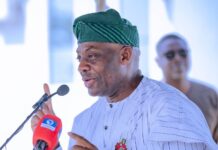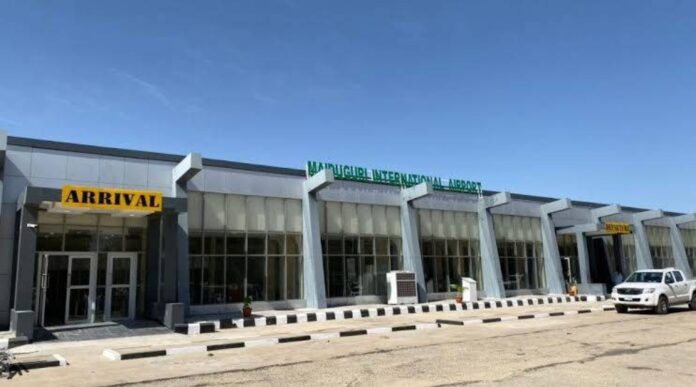In this interview, the international terminal manager, Maiduguri International Airport, Mr Ibrahim Bello, speaks on efforts by the government of Borno State and FAAN to modernise facilities at the airport and turn it into a regional hub as it’s the only airport that shares borders with three neighbouring African countries.
What infrastructural upgrades are being carried out so far at the airport?
The infrastructural upgrade, especially the terminal extension came up when the Governor saw the need to collaborate with the Federal Airports Authority of Nigeria (FAAN) and the aviation ministry to upgrade the airport. So, he went to see the minister, spoke with him and the minister gave his word. The minister came here with all the heads of agencies, FAAN, NAMA, NCAA, and other aviation stakeholders and with the governor they took a facility tour of what was on the ground
Later we sat down, and so many things were brought out – what was on the ground, what was not on ground, what needed to be upgraded, and what needed to be provided. The minister asked all the agencies, the heads of agencies, to come up with their plan for the upgrade.
FAAN brought out its working plan; we made the provision in terms of equipment, facilities and manpower. The governor took it upon himself to do the structural work, the construction of the extension of the terminal.
FAAN submitted the drawing of what it wanted the terminal to look like and it was adopted and the state government started work immediately.
The work took a little while and, thank God, we have seen it to almost 90-something completion. So, FAAN, on its own side, has brought all the necessary equipment.
What are those facilities you are talking about?
We have digital checking counters; we are moving away from analog as we have in the old domestic terminal. They have weighing scale attached to them. The FAAN management also provided the seats for passengers; they also provided the screening machines, the conveyor belts and the carousel. All of them are on the ground right now. Some of them have been fixed while work on some is going on.
The upgraded facility has a passenger holding capacity of close to 500. The passenger holding capacity of 500 is at once. So, if we have more than one airline operating, we don’t have any issue. We can have more than one airline, two, three, operating at the same time. We will not have any issue. We used to have four scheduled flights. So, if we have those scheduled flights at the same time, we will not have any constraint in terms of facilities and equipment.
Aside scheduled operators, are there other operations at the airport?
Maiduguri has non-scheduled operators, which are the United Nations Humanitarian Air Services and the World Food Programme, Doctors Without Borders, as well as the International Community of Red Cross (ICRC). There are also scheduled non-commercial flights. We have the helicopter services here, global helicopters. In a day, we will have like five helicopter movements. So, there is a lot of traffic in Maiduguri.
How strategic is the airport for operations into the neighbouring countries?
Maiduguri is strategically situated; it has that strategic location advantage that airlines can take advantage of. It is the only airport that has borders with three countries – Chad, Cameroon and Niger – which is a very good opportunity for us and FAAN to explore a regional hub. We can have it; it has the strategic advantage than any other airport in the country. So, at FAAN, this is what we are looking at; at the local level…we are taking it up with our headquarters, to see how we can harness this opportunity.
What is the projected traffic for international flight operations when the airport finally comes on stream?
Yes, here is more like a hub. Once the international operation starts, we may start with the regional flights.
We can have a regional hub; we can have N’Djamena, Cameroon and Niger as well. These are border countries through Maiduguri. So, the regional hub can be extended into international routes as well.
We do our route, and we have been doing the route analysis for quite a while now, and it’s proven to be something that would work.
We can have a flight, maybe, Maiduguri and N’Djamena; we can extend it, maybe, to start from Kano; Kano-Maiduguri and N’Djamena, then Maiduguri-Kano. This is a well-established route, since the Trans-Saharan trade. It can be reactivated. Before, it used to be by camel and by road, but now we can introduce the flight advantage as well. Not only N’Djamena, we can extend it to Central Africa, which is Bangui. That used to be the trade route in those days.
Are you into a discussion with any particular airline?
Yes. We have one of our operators here that has shown interest. It has done its own route analysis. We have been talking about it for years. Even recently, one of them called me and we had some discussion. So, they too are at their own level, they are doing it, and we at the station level, we are doing it.
Could you speak on the government agencies that will be in charge of the international borders at this airport?
Yes, we have a very good relationship with the agencies, Immigration, the Border Control, DSS, and Customs. The first time the minister came all their representatives came as well. So, we sat down, we analysed what is on the ground and everybody went back and came up with their own implementation plan.
Are there facilities for them to work here?
Yes, the facilities are ready. For now, what we have is the domestic site. We are trying to push our domestic operation here. Then we made reconfiguration. Just a little reconfiguration of what we have on the other side, to accommodate the international operations.
Maiduguri plays a strong role during the Hajj operation. How many states usually converge here?
Yes, we have two states here, Yobe and Maiduguri. And this is why, at the airport level; I would say that we did excellently well because this is one of the airports that do not have a Hajj terminal. We have the terminal, but due to the insurgency, the terminal has been taken over by the military. So, we usually co-locate our operations, both domestic and hajj operations in one terminal. And this usually gives us a serious challenge. But with the help of FAAN management, we are able to navigate through.
Since I came here, we have had two Hajj operations. And this is what we usually have, because the two states operating here, Yobe and Maiduguri, have large numbers of pilgrims. So just imagine having your domestic operation, doing it alongside your domestic operation. Sometimes we have two or three domestic operations. It is really very challenging.
What are the cargo potential of the airport?
Yes, there is a lot of cargo traffic here, in terms of livestock and foodstuffs as well. As I mentioned, on the trade routes from Maiduguri, N’Djamena, Cameroon, and Niger, there is a lot of cargo advantage there that can be enhanced.
Recently, somebody from the ministry of livestock came. We are having some discussions with them on how to make that possible.
Both Yobe and Maiduguri have their own reach outside the country. They are talking to some investors to come and see the potential here. And also, a lot of cargo potential is here, because we have very good land here in Maiduguri and Yobe. Not only that, this is the regional airport. It has Yola, Gombe and Bauchi under it. These are all states that are blessed in terms of agricultural production.
If international operations start, what is your projection in terms of passenger traffic?
When we looked at the route analysis at our own level here, we went as far as going into town to see the car parks where people are loaded with the buses going to Chad and other neighboring states. What we found out is not everybody that uses buses can afford aircraft, but when the aircraft is available, somebody will look at that as an advantage. So, we have a considerable amount of traffic here.
Maybe not necessarily a Boeing 737, but a smaller aircraft like the Embraer or the Bombardier aircraft.





























































